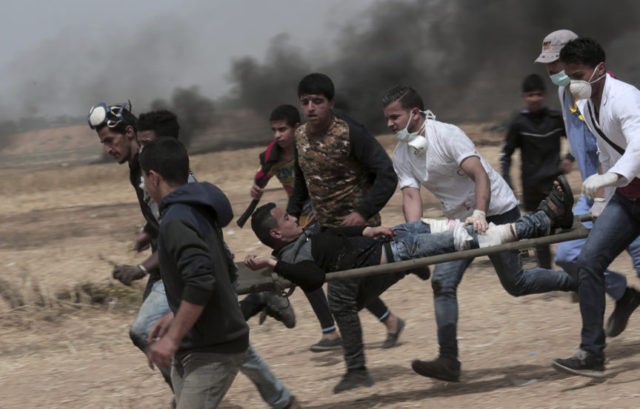JEBALIYA REFUGEE CAMP, Gaza Strip (AP) — Israel’s defense minister said Saturday that Hamas leaders are the “only culprits” in continued bloodshed on the Gaza border, as the EU and a top U.N. official made new demands to investigate shootings of unarmed Palestinians by Israeli soldiers, including the killing of a 14-year-old boy.
Avigdor Lieberman’s comments on Twitter came a day after four Palestinians, including the teen, were shot and killed by Israeli army fire from across the border fence, according to Gaza health officials.
More than 150 Palestinians were wounded Friday, in the fourth round of weekly Hamas-led mass protests in the border area.
The teen, Mohammed Ayyoub, was about 150 meters (yards) from the fence when he was hit, Gaza photographer Abed Alhakeem Abu Rish told The Associated Press. He said that the boy was about to take cover when he was shot and fell to the ground, collapsing head first.
The latest deaths brought to 32 the number of Palestinians killed by Israeli troops in protests since late March.
More than 1,600 have been wounded by live rounds in the past three weeks, according to the Gaza Health Ministry.
The rising Palestinian casualty toll signaled that Israel’s military is sticking to its open-fire rules despite international criticism of the use of lethal force against unarmed protesters.
Israel has said it is defending its sovereign border, including Israeli communities on the other side. It has alleged that Hamas uses the protests as cover for attacks and for damaging the border fence. Rights groups have said Israel’s open-fire orders are unlawful because they effectively allow soldiers to open fire on unarmed demonstrators.
The marches are part of what organizers have billed as an escalating showdown with Israel, to culminate in a mass march on May 15.
The top Hamas leader, Ismail Haniyeh, said Friday that people should get ready for large crowds spilling across the border that day.
“Our people will outnumber the occupation and force it from our land,” he said, referring to Israel.
The latest killings sparked new demands by a senior U.N. official and by the European Union for an investigation.
Nikolay Mladenov, a top U.N. envoy in the region, said on Twitter that it is “outrageous to shoot at children.”
The European Union urged the Israeli military to “refrain from using lethal force against unarmed protesters.”
Mohammed Ayyoub’s father, Ibrahim, said Saturday that his son was killed in cold blood.
“Mohammed did not deserve to be executed,” the 42-year-old said as mourners streamed to the family’s shack in the Jebaliya refugee camp. “He was not holding a stone or a gun … Mohammed was not running toward the fence.”
The Israeli military has not commented on the latest shootings. It has said it will not allow protesters to get close to or damage the fence. On Friday, it dropped leaflets over Gaza, urging protesters to stay away.
Lieberman, the Israeli defense minister, said on Twitter that “the only culprits in the death of the … boy in Gaza are Hamas leaders.”
He said they are “cowardly leaders who hide behind women and children and send them forward as a human shield, so that they can continue to dig tunnels and carry out terrorist actions against” Israel.
Hamas says the protests are aimed at breaking a border blockade that was imposed by Israel and Egypt after the Islamic militant group overran Gaza in 2007, a year after winning Palestinian parliament elections.
The marches also press for a “right of return” of Palestinian refugees and their descendants to what is now Israel. Hundreds of thousands of Palestinians fled or were forced from homes in the 1948 war over Israel’s creation. Palestinians mark May 15, the anniversary of Israel’s founding, as their “nakba,” or catastrophe, to mourn their mass uprooting.
While Hamas and smaller Palestinian factions have taken a lead as organizers, the mass marches are also fueled by growing desperation among Gaza’s 2 million residents.
The border blockade has trapped nearly all of them in the tiny coastal territory, gutted the economy and deepened poverty. Gaza residents typically get fewer than five hours of electricity per day, while unemployment has soared above 40 percent.
___
Laub reported from Jericho, West Bank.

COMMENTS
Please let us know if you're having issues with commenting.